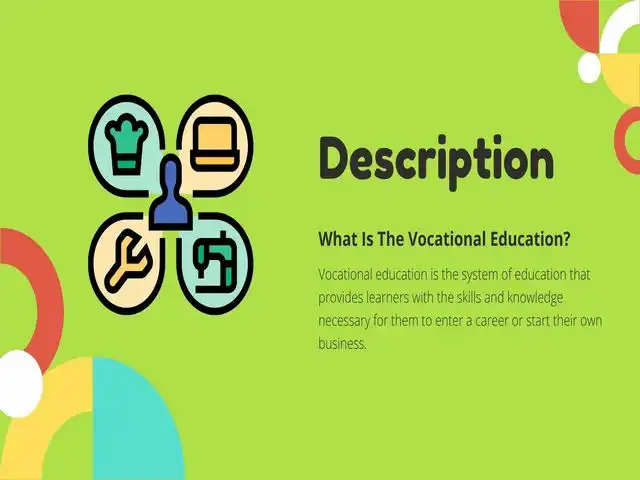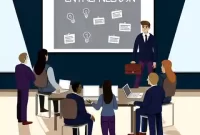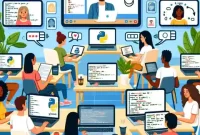Vocational education is the system of education that provides learners with the skills and knowledge necessary for them to enter a career or start their own business.
Vocational training can vary from high school to college but most often in a community college or vocational school. In this type of education, students learn practically by performing hands-on work within their field of study. They also can take courses outside of their area that helps them develop transferable skills such as communication, time management, and problem-solving.
Some people also call this type of education “career development” because it helps workers gain skills for success in their careers.
This type of education is often less expensive than traditional college degrees because it is self-paced, online, and can be taken in-between full-time jobs.
Vocational education is for students who want to work in a specific industry and those who want to work in general. It helps them gain skills and knowledge in their future career.
Benefits of Vocational Education
- First, vocational education is an excellent way to ensure that students are learning the subject they’re studying and learning about life skills.
- Second, vocational education can provide students with opportunities for internships and employment. Students will gain work experience and build their resumes before entering the workforce.
What is the difference between vocational education and higher education?

Vocational education is a type of education that focuses on teaching students skills that are needed to enter the workforce. Students who attend vocational schools have a specific goal in mind for their career and are interested in learning a particular trade or skill.
Higher education is an educational institution that focuses on teaching students theoretical knowledge, such as science, history, literature, and philosophy. These institutions offer degrees in these subjects, and higher education institutions also focus on practical skills such as business and law.
What are some parts of a vocational school?
A vocational school is a school that offers students training in a specific trade or profession.
Some of the parts of a vocational school include:
- Curriculum: The curriculum for students to study includes courses and lessons.
- Classrooms: Classrooms are where students learn and participate in activities.
- Labs: A lab is where students work on projects and experiments with hands-on learning.
- Teachers: Teachers are professionals who teach the curriculum to the students.
- Administration: Administration includes people who plan, organize, and direct the school’s operations.
What are some common professions that require vocational training?
Some of the most common professions that require vocational training are truck driving, culinary arts, and medical assistants.
These are just some of the many occupations that require specialized training and education to perform their job. This is why students need to take some time to explore what they want to do in their future careers.
Are there different types of vocational education?
There are many different types of vocational education, and they all have other goals and outcomes. But it is important to note that the goal of all vocational education is to provide students with skills needed for a specific job or industry.
There are three types of vocational education:
- Vocational Education and Training (VET)
- Apprenticeship
- Career and Technical Education (CTE)
How does vocational education differ from other types of schools?
Vocational education is a type of education that prepares students for a specific job or trade.
It contrasted with academic education, designed to prepare students for higher-level careers. Vocational schools may offer certificates, diplomas, and associate degrees.
Vocational schools are often more focused on practical knowledge and skills than academic schools. They provide hands-on training and instruction in the field of study that students will use in their future careers. Vocational school courses may also offer a greater emphasis on job placement assistance, and career counseling than other types of schools do.
Vocational schools typically offer more career-oriented options than colleges, which focus on teaching general knowledge, such as math and science.
How can I find a vocational school near me?
There are many vocational schools near you in your state. You can also find a school through the internet.
To find a vocational school near me, I would check the map and see one nearby. I also might want to check out the school’s website to see if any programs interest me.
How is vocational education different from academic education?
Vocational education is a type of education that focuses on training students for a job. Vocational education is typically offered to students in high school, but it can also be offered to secondary students or even adults.
Vocational education differs from academic education in that vocational schools focus on practical learning and the skills needed for a particular job or occupation. Vocational schools teach specific skills and knowledge related to the industry, not general knowledge like academic institutions do.
Academic institutions teach general knowledge and skills needed for many different jobs or occupations, while vocational institutions focus on specific skills required in specific industries. Educational institutions also usually offer more flexibility when scheduling classes, while vocational programs tend to be rigidly scheduled to provide the most effective learning.
Why should students choose a vocational path over an academic path?
Students should consider vocational options because they offer better opportunities and job security.
The professional paths that students can choose from are:
- Career development
- Business
- Education and teaching
- Engineering
- Technology
- Design
- Construction
Online Courses for Vocational Education
The popularity of online courses has increased in recent years, and this trend is expected to continue. This can be attributed to the convenience and accessibility offered by these programs. However, it is essential to note that not all online vocational education programs are equal. Some may be better suited for specific purposes or goals than others, so it is important to research and compare before signing up for any program.
Online courses are a great way to explore different career options and learn a particular subject.
The benefits of online courses include:
- You can learn at your own pace without the need to commute or take time off work.
- You can learn from anywhere in the world.
- You can learn from people with different backgrounds and experiences, which helps you grow and develop new skillsets.
Udemy is a platform that enables learners to find and access online courses on various topics for free. People from all walks of life have used it, and the skills they have learned can be applied in different fields.
Udemy offers a wide range of courses for professional development, personal growth, and career exploration. It is an excellent way to learn new skills, explore your career options, or gain foundational knowledge in any subject.
The world is full of opportunities for people willing to learn new skills and take on new challenges. Udemy provides an excellent platform to explore these opportunities and start learning today.
Conclusion
The benefits of online courses are that they are flexible and accessible, and they can be completed at any time, from anywhere.
Online courses offer students the ability to learn on their schedule, without the need for a physical classroom. They also allow students to take their education with them everywhere they go.
Online courses have become a popular way for students to complete their education in the past few decades because of their flexibility and accessibility. Online courses offer students the ability to learn on their schedule, without the need for a physical classroom. These online classes also allow students to take their education with them everywhere they go, making it easier than ever before for people to complete their degrees or further educational opportunities while still working or raising a family.


